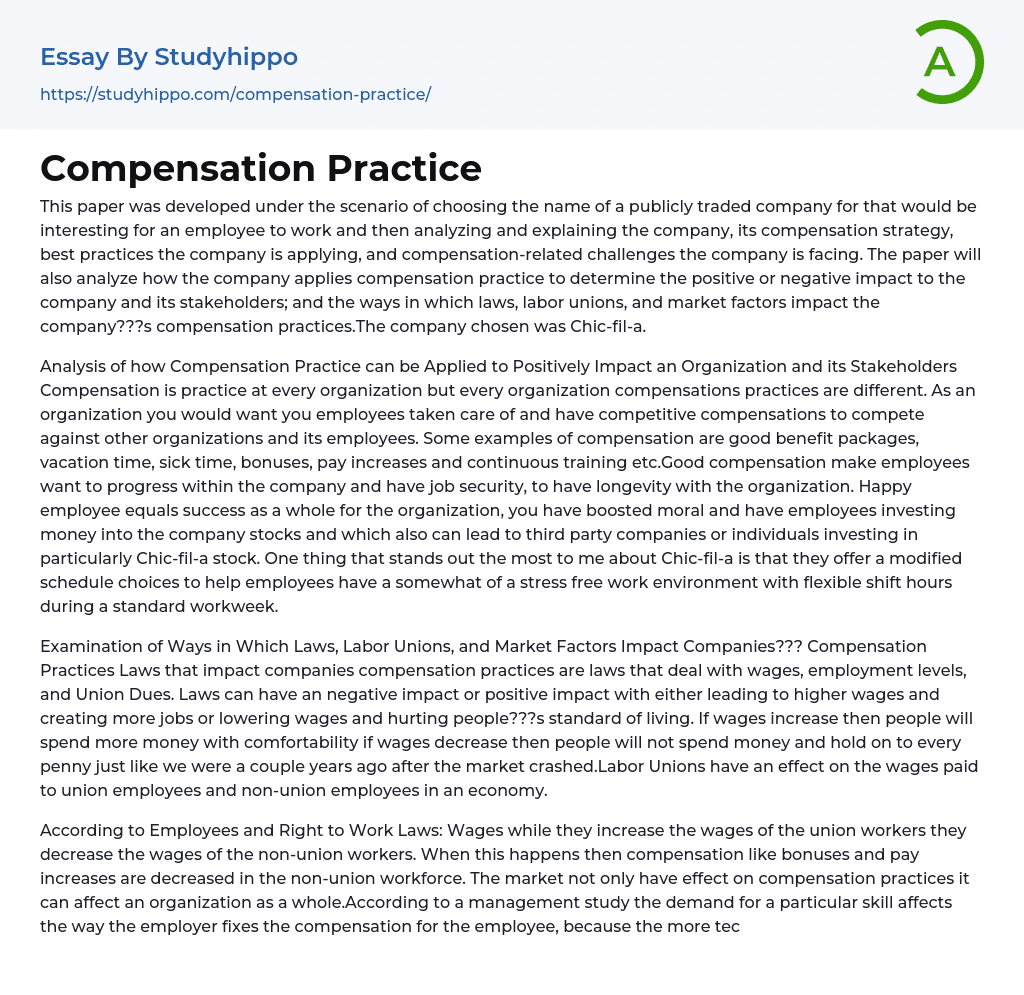In this paper, the focus is on Chic-fil-a and its selection of a name that would be attractive to employees. Furthermore, an analysis is conducted on the company's compensation strategy, including best practices and challenges faced in relation to compensation. The aim is to explore how the company's compensation practices impact stakeholders while taking into account external factors such as laws, labor unions, and market trends.
Compensation is a common practice in organizations, but each organization has its unique approach. A well-compensated workforce demonstrates an organization's care for its employees and their competitive compensation. Such compensation includes a good benefit package, sick time, vacation time, bonuses, pay increases, continuous training, among others. By having such compensation packages, employees feel valued by the organization and aspire to grow and secure their career with the organization. A successful organization is
...one that has happy employees who are highly productive, investing in company stocks while also attracting third-party investors. Chic-fil-a stands out because they offer modified schedules, enabling their employees to work without stressing over time-related constraints.
The exam will focus on how laws, labor unions, and market factors affect companies' compensation practices. Employment laws related to wages, employment levels, and union dues can have a significant impact on these practices. This impact can result in positive or negative outcomes such as increased or decreased compensation rates as well as job creation or loss. Higher wage rates lead to more spending while lower wage rates encourage frugality during economic instability. Additionally, labor unions influence the salaries of both unionized and non-unionized employees in the economy.
The presence of unions and right-to-work laws can impact compensation for both union and non-unio
workers. Typically, unions result in higher wages for their employees while non-union workers may experience a decrease in pay and benefits like bonuses or raises. Market forces significantly influence an organization's compensation policies and structure, with factors such as demand for certain skills - which tend to rise with technological advancements - playing a vital role. Furthermore, business cycles also affect how much companies are willing to offer their workers.
When discussing the effectiveness of compensation approaches, it's crucial to consider how urgently positions need to be filled. This urgency greatly affects an employer's willingness to pay their employees. Traditional seniority and merit-based pay are compared with incentive-based and person-focused methods in this evaluation. Seniority pay rewards employees for staying with a company for a long time and improving their skills, but research indicates that employees may feel their pay is not increasing over time, leading them to leave the organization.
Seniority-based pay increases are common in government jobs, such as my experience serving in the Navy where all ranks received equal annual pay increases regardless of seniority. In contrast, merit pay rewards job performance and aims to retain valuable personnel while motivating future employees. Employees who meet certain job performance standards can receive bonuses, extra vacation days, and pay raises under Chic-fil-a's merit pay system. For organizations seeking continued growth, using incentive-based compensation alongside a person-focused approach is considered crucial.
Companies typically offer cash-based incentives of 15%-35%, such as bonuses or commission checks, to their lead executives. Chic-fil-a is well-known for this type of compensation plan. If you become a Chic-fil-a franchisee, you can expect to receive a commission check every 6 months and a bonus check
every year, simply for being part of the franchise. However, it is important to note that owning a Chic-fil-a franchise requires full dedication as no other business ventures are permitted.
References: http://www.glassdoor.com/Reviews/Chick-fil-A-Reviews-E5873.htm http://www.managementstudyguide.com/factors-affecting-compensation.htm
- Raising Minimum Wage essays
- American Dream essays
- Barriers To Entry essays
- Capitalism essays
- Central Bank essays
- Compensation essays
- Consumerism essays
- Economic Development essays
- Economic Growth essays
- Economic Inequality essays
- Economic System essays
- Economy essays
- Employment essays
- Export essays
- Finance essays
- Free Trade essays
- Gross Domestic Product essays
- Human Development essays
- Income Inequality essays
- Industry essays
- Inflation essays
- International Business essays
- International Trade essays
- Macroeconomics essays
- Materialism essays
- Max Weber essays
- Microeconomics essays
- Minimum Wage essays
- Monetary Policy essays
- Monopoly essays
- Pricing essays
- Profit essays
- Recession essays
- resources essays
- Taxation essays
- Trade essays
- Unemployment essays
- Warehouse essays
- World economy essays
- Career essays
- Career Path essays
- Homeless essays
- Labour Economics essays
- Occupational Safety And Health essays
- Pension essays
- Profession essays
- Salary essays
- Strike Action essays
- Wage essays
- Working Together essays




